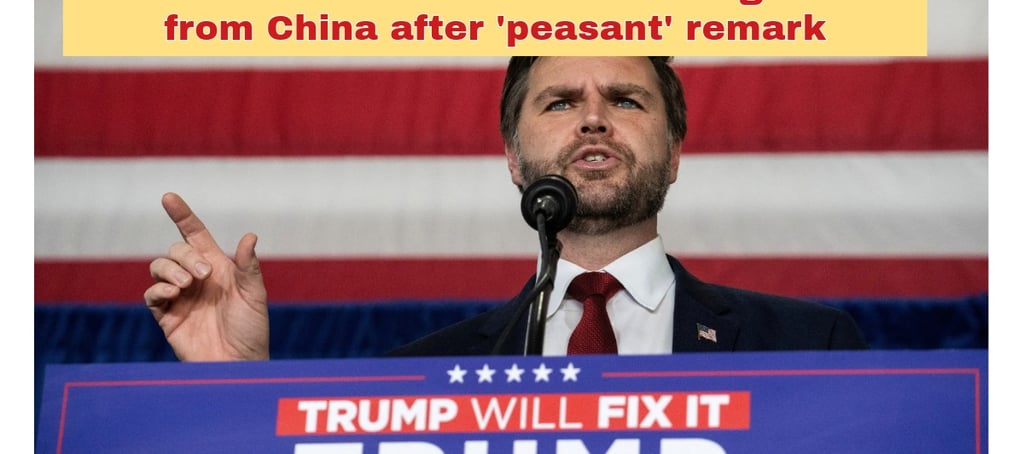JD Vance’s ‘Chinese Peasants’ Blunder: A Wake-Up Call for America’s Fading Diplomacy
4/15/2025


JD Vance’s "Chinese Peasants" Remark Sparks Outrage – A Sign of U.S. Political Decline
On April 8, 2025, U.S. Vice President JD Vance ignited a diplomatic storm during a Fox News interview, saying, “We borrow money from Chinese peasants to buy the things those Chinese peasants manufacture.” Defending Trump’s tariffs amid escalating U.S.-China trade tensions, Vance’s comment drew sharp rebuke from China’s Foreign Ministry, which called it “ignorant and disrespectful.” This incident reflects not just Vance’s arrogance but a broader decline in U.S. political culture.
Why Did Vance Say This—and Why Was It Disrespectful?
Vance aimed to highlight America’s trade deficit with China, aligning with Trump’s tariff push, including a threatened 50% tax on Chinese imports. By calling Chinese citizens “peasants,” he sought to depict China as backward, appealing to a domestic audience wary of globalization. But the term “peasant” is deeply offensive in China, tied to historical poverty and feudalism—a stark contrast to China’s modern economic power. The label dismisses China’s progress, making Vance’s remark not just inaccurate but culturally insensitive.
This reflects a U.S. political trend of inflammatory rhetoric. Unlike Chinese officials, who avoid personal attacks—never calling Biden a “war criminal” or Trump a “failed businessman”—American leaders like Vance and Trump often resort to derogatory language. This contrast reveals a gap in political culture, with China prioritizing diplomatic restraint while the U.S. leans into provocation.
The Decline of U.S. Political Elites
Vance’s comment underscores a broader decline in U.S. political decorum. Once, China and the U.S. coexisted despite differences, with many Chinese admiring America. But Trump’s first term (2017-2021) eroded that goodwill through tariffs, racist rhetoric, and COVID-19 conspiracy theories. Trump’s tariffs, now totaling $79 billion, have failed to boost U.S. jobs while risking a global recession (Tax Foundation, 2025-04-11). Vance, once a Trump critic, now mirrors this divisive approach, further damaging America’s global image.
The Chinese public, increasingly disillusioned, no longer sees the U.S. as a moral leader. Meanwhile, U.S. leaders’ casual insults contrast with China’s restraint, highlighting America’s fading soft power as China’s influence grows.
Conclusion
Vance’s “Chinese peasants” remark is more than a gaffe—it’s a symptom of U.S. political decline. As trade tensions rise, America must choose: lead with respect or continue alienating the world. For now, Vance’s words show a nation struggling to maintain its global standing.
What do you think about JD Vance’s “Chinese peasants” comment—did he cross a line, or was he just stating a harsh truth?
How should the U. How should the U.S. handle its trade tensions with China—by imposing more tariffs or focusing on diplomacy? Share your thoughts
Do you agree that U.S. political rhetoric has become too disrespectful, or is this just part of the tough global politics? Let’s hear your take!
hello@boncopia.com
+13286036419
© 2025. All rights reserved.